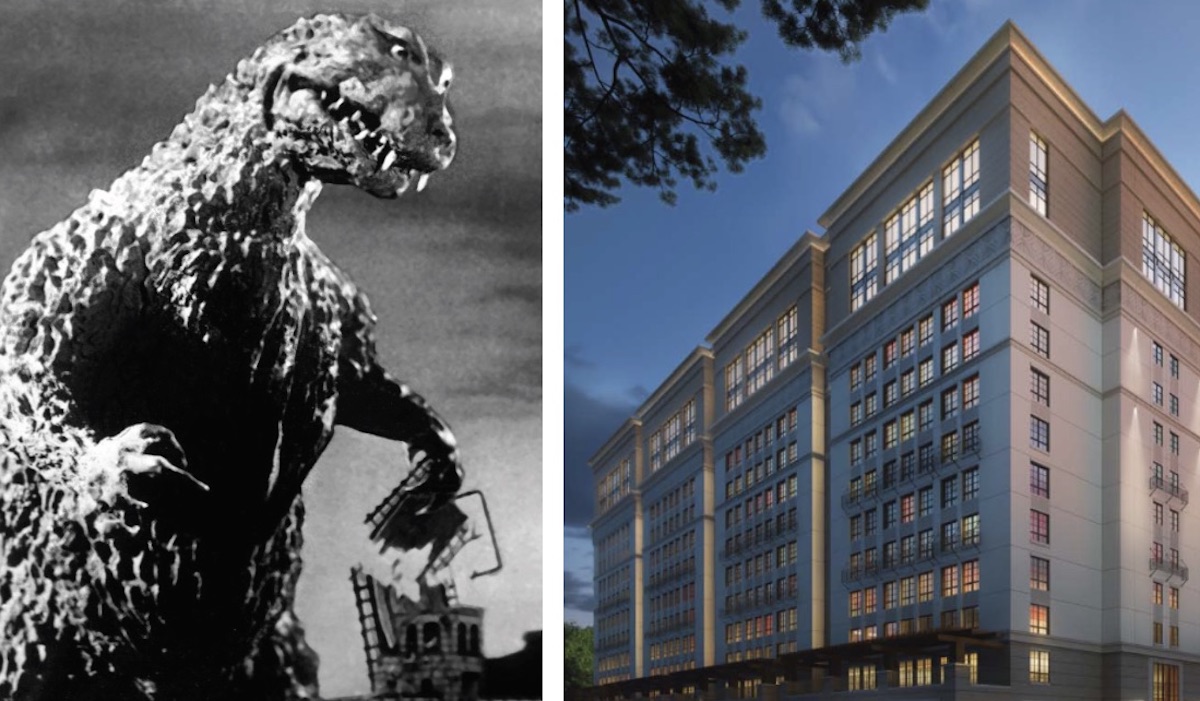The News Letter | Many Cower in the Face of Dormzilla
With Windowless Rooms Not Much Bigger Than Prison Cells, Mental-Health Concerns Arise

The people have spoken, and they’re predictably freaked out by the Munger Residence Hall proposal, an 11-story monolith of a dormitory slated for the northwest end of UCSB.
At an open hearing last week, concerns were raised about the size of the mostly windowless bedrooms. With dimensions of 7 by 10 feet, more than one speaker pointed out, they’re not much bigger than the average U.S. prison cell, which measures 6 by 8 feet.
What kind of effect would that have on the occupants’ mental health? they asked. And with so many rooms stacked so closely together ― the single building is expected to house a mid-size town of 4,500 undergraduates ― what about noise?
Charlie Munger, the investor-philanthropist and self-trained architect behind the project, has said the small, single-occupancy bedrooms are meant to provide students with a private space of their own while at the same time encouraging them to spend time in open common areas, which do offer the luxury of windows. That will foster friendships and academic collaboration, he insists. The students will prefer it that way.
Personally, I’m dubious. I barely got through my freshman year at UCSB ― a double dose of depression and anxiety nearly laid me out ― and my room at the Santa Cruz Residence Hall had a beautifully big window to gaze out of.
But I’m staying open-minded about Munger’s design. Maybe he’s onto something. Maybe he knows things we don’t. Self-made billionaires are usually pretty sharp.
For instance, a top administrator at Harvard-Westlake School in Los Angeles, where Munger has designed several buildings, told reporters a couple of years ago with a straight face that Munger “can see into the future.”
The official pointed to Munger’s insistence that the walls of computer rooms in the library he was designing be removable. This was back in the early 2000s, before everyone had a laptop and often used public terminals to do their work. When students switched en masse to laptops, the computer rooms were easily converted for other uses.
That’s legitimately cool. What isn’t cool is the possibility that the windowless rooms of the graduate dorm Munger built at the University of Michigan have taken a major toll on the psyche and morale of the 600 graduate students living there.
Sign up for Indy Today to receive fresh news from Independent.com, in your inbox, every morning.
That was the assertion of a speaker at the UCSB hearing, who also suggested suicide rates at the campus went up not long after construction finished in 2015. Determining if that allegation has any merit is one of my next reporting projects. If you know anyone at the University of Michigan I could talk to, please drop me a line.
Private citizens weren’t the only ones with reservations about the mega-dorm. Santa Barbara Airport officials also took to Zoom to express their worry that the building’s 11 stories might interfere with flight paths. The airport’s main runway, they noted, is only a few thousand feet away.
In the scheme of things, the hearing was extremely preliminary. But it did foreshadow the many points of resistance the proposal is likely to face, not just from the public, but also from the regulators who hold its fate in their hands. How UCSB will respond is anyone’s guess. Will it be forced to redesign the project, scale it down, or scrap it altogether?
Speaking of seeing into the future, here’s a theory that’s going around:
Munger is famous for only donating money to schools for new buildings if they give him carte blanche on the blueprints. UCSB even admitted this week he chose its project’s building materials and ventilation.
Maybe in order to claim the $200 million Munger offered, UCSB is appeasing the eccentric billionaire by presenting his design as-is with the intention of changing it down the road. Munger, after all, is 97 years old and in not great health. Maybe UCSB can just take the money now and then wait him out. Maybe his estate will be more flexible with the terms of the donation.
That’s a pretty macabre theory, I know. And I’m sure it glosses over many legal details of the current agreement. But it also may help explain why UCSB has dragged its feet on the dorm, which was first announced in 2015, for so long and why it continues to be so cagey about its contract with Munger.
To that end, I just filed a California Public Records Act request with UCSB for a copy of the agreement. As a public university conducting public business, it should be fair game. But we’ll see. Their lawyers may stonewall me. Or they may give it up right away. No one really knows what the future holds.
Find all of our Munger Dorm stories at independent.com/munger-dorm.
Support the Santa Barbara Independent through a long-term or a single contribution.



